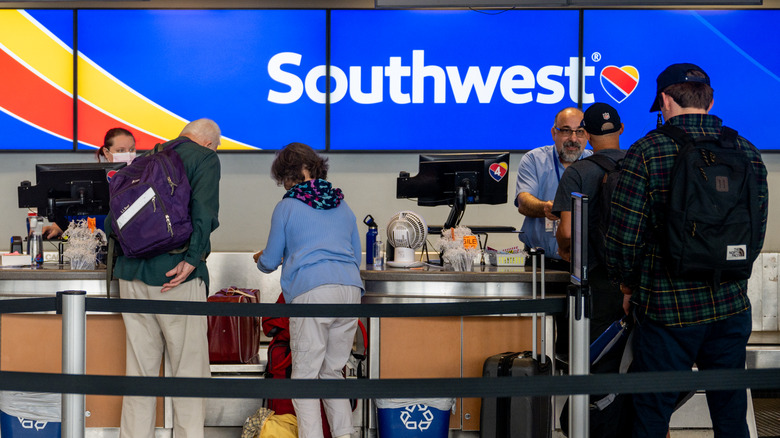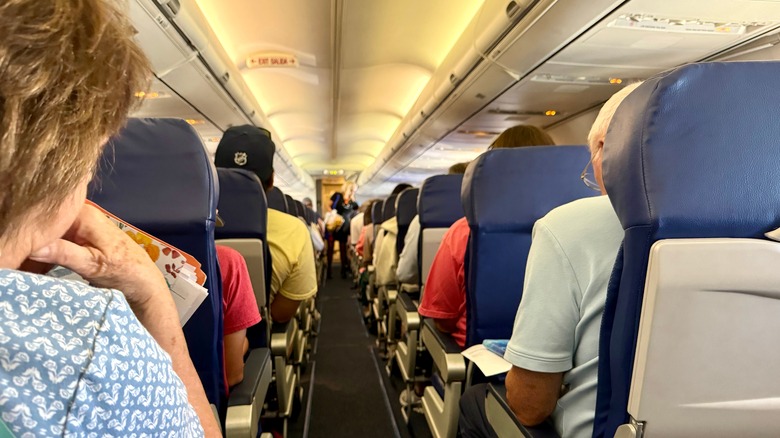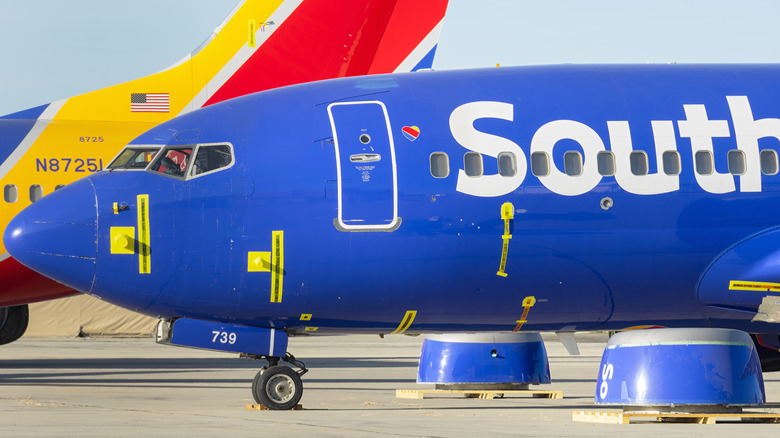Why Southwest Airline's Big Seating Change Is Sparking Controversy
After 50-plus years, Southwest Airlines is preparing to do away with its signature open-seating policy in favor of assigned seating on its flights. The airline announced its new business approach in a press release on July 25, 2024, framing it as a decision backed by research into "evolving customer preferences." As part of the overhaul, it will also introduce premium seating options and make booking red eye flights possible.
There's no word yet on when exactly Southwest will implement its seating changes, but the company told investors that more information should be forthcoming in late September. The news was met with disappointment from some customers, who took to social media platforms with complaints and questions. When pressed for more details, Southwest told one X user, "We expect bookings for flights with assigned seats and premium seating will be available sometime in 2025."
On its website, Southwest notes that it began flying out of Dallas in 1971 in order to "democratize the sky through friendly, reliable, and low-cost air travel." As America's leading low-cost carrier, it distinguished itself from other airlines partly by breaking from the typical seating model. Instead of having passengers pre-select seats in sections like economy or first class, it put them in boarding groups, with a letter and number determining their place in line. If you wanted a window or aisle seat, you would need to wait until your group boarded, at which point you could grab the seat of your choice on a first-come, first-served basis.
What's behind the pivot to assigned seating
Open seating has been a staple of Southwest since its foundation. For some customers, the airline's main appeal was this egalitarian process, though others have complained that people abused the system by saving seats or feigning disabilities for priority access. The controversy comes from Southwest abandoning one core feature that set it apart from other airlines. As it readies premium seats with extra legroom, some see the airline as no different than regular-cost carriers like Delta or United. CEO Bob Jordan stressed that another unique Southwest offering, the allowance of two free checked bags, will remain intact.
In its press release, Southwest stated, "The research is clear and indicates that 80% of Southwest customers, and 86% of potential customers, prefer an assigned seat. When a customer elects to stop flying with Southwest and chooses a competitor, open seating is cited as the number one reason for the change. By moving to an assigned seating model, Southwest expects to broaden its appeal and attract more flying from its current and future customers."
This spins the airline's decision as an attempt to meet overall customer demand, despite the vocal backlash in some corners online. For Southwest, it could also be an attempt to salvage what was once America's most profitable airline, per CNN. The airline still touts the success of its "47 consecutive years of profitability" from 1973 to 2019, though the pandemic ended that long run in 2020.
Southwest Airlines in the 2020s
During its 50th anniversary in 2021, Southwest had the most nonstop flights of any U.S. airline. However, its reputation took a hit in December 2022 when it was forced to cancel around 17,000 flights, stranding holiday travelers as it struggled to play catch-up with outmoded software following a severe winter storm. A year later, in December 2023, this infamous holiday meltdown left the airline stuck with a $140 million fine — the highest ever imposed — by the U.S. Department of Transportation.
As it entered 2024, Southwest's losses totaled over $1 billion, while its fleet of Boeing 737 aircraft faced increased scrutiny from the Federal Aviation Administration due to a number of high-profile safety incidents. It hasn't been a good year for airlines reliant on Boeing; even high-level engineers urge travelers to avoid this type of plane. Yet despite these recent troubles, Southwest was able to avoid service interruptions in July when a sweeping tech disruption caused worldwide flight delays and cancellations.
As it looks to restore its flagging financial fortunes, Southwest arguably can't afford to alienate customers with an unpopular new seating policy. It remains to be seen whether assigned seating is that, or whether it's truly something customers want. The perception for some lingers that it's just an excuse to boost revenue with premium seating. For passengers accustomed to choosing any open seat while boarding, just don't be surprised in 2025 when your seat on Southwest Airlines is now assigned.


